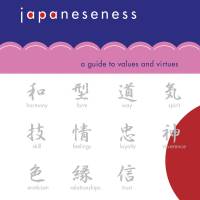Love it or hate it, Yoji Yamakuse's explanation of the concepts fundamental to Japanese behavior, "Japaneseness: A Guide to Values and Virtues," deserves a read.
Japaneseness, by Yoji Yamakuse
160 pages
Stone Bridge Press, Nonfiction.
According to the introduction by Stone Bridge Press, the book was originally published in 2014 for "Japanese people seeking to explain themselves and their culture to their non-Japanese friends." The implicit celebration of Japan's "uniqueness" (or superiority) may rub some the wrong way, but a closer look will diffuse most of the ire.
Yamakuse, a cross-cultural consultant and author of numerous popular publications in Japanese, explores a total of 76 concepts in the book. The core value "Revere the Gods and Buddhas" is explored through 15 briefly explained life concepts, including "reverence," "integrity," "the other world" and "transience."
At first, this small book seemed handy merely as an explanation of key Japanese ideas, such of giri (obligation), mono no aware (pathos), yugen (tranquility), or honne/tatemae (true feelings/facade), but it gradually won me over with its simple, matter of fact prose. Yamakuse uses this objective tone to quietly point out the many contradictions between Japanese ideals and reality, as when explaining the idea of kū (emptiness): "Despite their economic attainments, many Japanese are spiritually exhausted. Deep in their hearts, many Japanese want to experience the fulfillment and beauty of kū."
Although ostensibly an explanation of one culture, the book is valuable for the way it lets us look at humanity through a specific cultural lens.


















With your current subscription plan you can comment on stories. However, before writing your first comment, please create a display name in the Profile section of your subscriber account page.